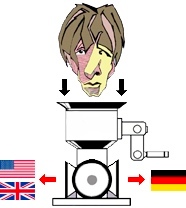Reuse of Translation Memory - How fair is it? Thread poster: lumierre
|
|---|
lumierre
Local time: 04:56
Member (2013)
German to English
+ ...
I am a bit in doubt on the use of TM by clients.
When I translate a document, I understand that I would be paid for this translation and the Client receives it, either in the translated file and/or in the translation memory (TM), but when the same TM is used to fill in the translation of another source document, it means the provider uses my translation for a second file and possible other future texts, without paying me for it. This reuse of my delivery creates the clients further revenu... See more I am a bit in doubt on the use of TM by clients.
When I translate a document, I understand that I would be paid for this translation and the Client receives it, either in the translated file and/or in the translation memory (TM), but when the same TM is used to fill in the translation of another source document, it means the provider uses my translation for a second file and possible other future texts, without paying me for it. This reuse of my delivery creates the clients further revenue, on the basis of my prior work. Is that fair? How one deals with this?
I have seen a lot of recent crowd-based agencies generating further revenues based on the reuse of prior translation memories from translators, and I do not think this is a fair business practice, to say at least.
[Edited at 2016-09-23 11:09 GMT]
[Edited at 2016-09-23 12:07 GMT] ▲ Collapse
| | | | | I feel it's ok | Sep 23, 2016 |
Your translation can be re-used whether or not it's in a TM. Any paragraph or sentence you translate can be re-used, independent of the medium in which you delivered it.
Also, it's part of what the client pays for. When they buy your translation, they do so with the expectation that they will be able to re-use it for their normal business purposes as they please.
I suggest you raise your rates until you reach a level that you feel comfortable about in a business environ... See more Your translation can be re-used whether or not it's in a TM. Any paragraph or sentence you translate can be re-used, independent of the medium in which you delivered it.
Also, it's part of what the client pays for. When they buy your translation, they do so with the expectation that they will be able to re-use it for their normal business purposes as they please.
I suggest you raise your rates until you reach a level that you feel comfortable about in a business environment where you know that your work will or may be re-used. ▲ Collapse
| | | | Samuel Murray 
Netherlands
Local time: 04:56
Member (2006)
English to Afrikaans
+ ...
| You agree to it | Sep 23, 2016 |
lumierre wrote:
When the same TM is used to fill in the translation of another source document, it means the provider uses my translation for a second file and possible other future texts, without paying me for it.
In this day and age, I think that unless you specifically state that you deny a client the right to re-use your translation, it can be assumed that you had given him permission to do that when you accepted the job. If you think it is unfair for clients to reuse your translation without paying you, then you should add that stipulation to your agreement with your clients and make sure they are aware that you charge extra for re-use rights.
| | | | Jan Truper 
Germany
Local time: 04:56
English to German
| Give and take | Sep 24, 2016 |
I see no problem with a client using my work in their TM.
I even watch out to maintain the integrity of their TM while working, and I sometimes flag issues that might arise when the sensible translation of a segment leads to errors in their TM (this can be the case when I am translating faulty source segments, for example).
This is in my own interest, since clients often hire me again, in which case I want a spotless TM.
On the other hand, I often integrate my translatio... See more I see no problem with a client using my work in their TM.
I even watch out to maintain the integrity of their TM while working, and I sometimes flag issues that might arise when the sensible translation of a segment leads to errors in their TM (this can be the case when I am translating faulty source segments, for example).
This is in my own interest, since clients often hire me again, in which case I want a spotless TM.
On the other hand, I often integrate my translations into my own base TM, which can make my work easier on future projects even for other clients. (You just have to watch out that you don't violate any NDAs when you do this.) ▲ Collapse
| | |
|
|
|
Sheila Wilson 
Spain
Local time: 03:56
Member (2007)
English
+ ...
| There ia an alternative | Sep 24, 2016 |
I don't see how you can deliver something to the client yet refuse to give them full use of the deliverable. But you could refuse to deliver the TM. It might not go down well, so I'd advise you not to come up with the idea between doing the work and being paid for it but we're engaged principally to provide a translation - not TMs. but we're engaged principally to provide a translation - not TMs.
I've personally never - in nine years - delivered a TM to a client, although I do use ... See more I don't see how you can deliver something to the client yet refuse to give them full use of the deliverable. But you could refuse to deliver the TM. It might not go down well, so I'd advise you not to come up with the idea between doing the work and being paid for it but we're engaged principally to provide a translation - not TMs. but we're engaged principally to provide a translation - not TMs.
I've personally never - in nine years - delivered a TM to a client, although I do use them. But then, they've never asked . I prefer the client to see them as a sort of loyalty reward: keep with me and you'll benefit from discounts; go elsewhere and you'll lose that benefit derived from your past jobs. But I suppose that only works with direct clients and agencies you have a special relationship with. . I prefer the client to see them as a sort of loyalty reward: keep with me and you'll benefit from discounts; go elsewhere and you'll lose that benefit derived from your past jobs. But I suppose that only works with direct clients and agencies you have a special relationship with. ▲ Collapse
| | | | lumierre
Local time: 04:56
Member (2013)
German to English
+ ...
TOPIC STARTER | computer analyse of TM for matching purpose | Sep 29, 2016 |
I am also wondering on the use of TM analyse by new translation portals and softwares...
Making a TM available for public, even if it is a closed public, means copyright infringement. It also rises concerns on using the translation results of a translator, without responsibility and remuneration due... I personally consider this use of translators TM as not appropriate. What would be the pro and cons of this?
| | | | Tom in London
United Kingdom
Local time: 03:56
Member (2008)
Italian to English
| Big discussion | Sep 29, 2016 |
lumierre wrote:
I am also wondering on the use of TM analyse by new translation portals and softwares...
Making a TM available for public, even if it is a closed public, means copyright infringement. It also rises concerns on using the translation results of a translator, without responsibility and remuneration due... I personally consider this use of translators TM as not appropriate. What would be the pro and cons of this?
There is a big discussion about this going on in the Italian forums here:
http://www.proz.com/forum/italian/306425-come_comportarsi_con_le_memorie_di_traduzione.html
| | | |
lumierre wrote:
Making a TM available for public, even if it is a closed public, means copyright infringement.
No, it doesn't per se. Feel free to correct me, though.
lumierre wrote:
It also rises concerns on using the translation results of a translator, without responsibility and remuneration due...
That is something you have to negotiate with your client. I would imagine that the additional restrictions and expenses (and possibly risks) would make your work worth significantly less to the client and thus be counterproductive.
lumierre wrote:
I personally consider this use of translators TM as not appropriate. What would be the pro and cons of this?
Without doing an in-depth legal analysis (not that I am an expert of the idiosyncracies of various legal systems) I would imagine that whatever rights you have to your translation would, in principle, apply to the content itself and not be tied to the particular form and medium in which it is expressed (especially so in the case of TM, which technically is little more than a database showing relations between two versions of the existing content). Do you believe a translator ought to have separate rights to the TM in addition to the rights in the translation itself? If so, why? Anyone who has both source and target documents (namely, your client and whoever they share these documents with, which can often be the whole world) and wishes to re-use their content for another translation can trivially create and align a new TM. They can also open both documents side by side and do a lot of navigating and copy-pasting. How is one of these situations fundamentally different from the other?
Also, consider the implications of a translator holding copyright over a way a particular sentence is expressed in the target language and forbidding its reuse without paying royalties. Wouldn't the translation industry grind to a halt in very short order? Since you are concerned about your translations being reused without your knowledge or explicit consent, this is basically what you seem to be advocating.
| | |
|
|
|
lumierre
Local time: 04:56
Member (2013)
German to English
+ ...
TOPIC STARTER
As I see it:
1. The use of my translation is free of royalties for my client. Any other use by any other person, with or without my knowledge and consent, and without the consent of my client affects that end client, and that is illegal, by all means. The use of bulk TM for a @matching analyse means an open backdoor for an illegal entry into a private property.
2. Moreover, reuse of same translation by preserving the TM in outsourcer DB should not be free of royalties. ... See more As I see it:
1. The use of my translation is free of royalties for my client. Any other use by any other person, with or without my knowledge and consent, and without the consent of my client affects that end client, and that is illegal, by all means. The use of bulk TM for a @matching analyse means an open backdoor for an illegal entry into a private property.
2. Moreover, reuse of same translation by preserving the TM in outsourcer DB should not be free of royalties. That goes valid for any other author work, literary, journalism, software etc.. the translation service is part of same type of creation, under same type of copyright and royalties law stipulations: no reuse without the consent of the author. Even with consent, no reuse without royalties, as contracts made when one party gets all and the other nothing *lion gets it all type, like the case of an unlimited reuse without paying any royalty, are, by law, null and void. I have the feeling that people or companies doing this are liable under the law and this method, although interested for developers, is not quite legal.
[Edited at 2016-09-29 14:15 GMT] ▲ Collapse
| | | | | I sell my expertise | Sep 29, 2016 |
For a number of years already, my point of view is that I sell my expertise, not my translation memories. Customers pay me because they trust that I am capable of producing meaningful translations of their materials. What they then do with the translations (in whatever the form) is none of my business: when they need my expertise again, I am here!
| | | | To report site rules violations or get help, contact a site moderator: You can also contact site staff by submitting a support request » Reuse of Translation Memory - How fair is it? | Pastey | Your smart companion app
Pastey is an innovative desktop application that bridges the gap between human expertise and artificial intelligence. With intuitive keyboard shortcuts, Pastey transforms your source text into AI-powered draft translations.
Find out more » |
| | Protemos translation business management system | Create your account in minutes, and start working! 3-month trial for agencies, and free for freelancers!
The system lets you keep client/vendor database, with contacts and rates, manage projects and assign jobs to vendors, issue invoices, track payments, store and manage project files, generate business reports on turnover profit per client/manager etc.
More info » |
|
| | | | X Sign in to your ProZ.com account... | | | | | |











